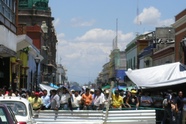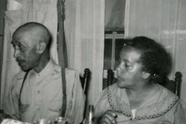The Roundup Top Ten for October 21, 2022

Don't Pit Rosa Parks Against Claudette Colvin – Recognize the Movement Both Shared Inby Jeanne Theoharis and Say BurginMultiple myths about Rosa Parks – that she was a reluctant and accidental crusader, or that she usurped the leadership of the younger Claudette Colvin – obscure the grassroots movement in Montgomery and the intergenerational mentorship the two women shared. |

Will Court's Abortion Overreach Galvanize Believers Who Prefer Secular Society?by Jacques BerlinerblauNot all religious Americans loathe a secular society; many see it as the best protection of their own personal freedom of worship and conscience. Challenges to Florida's new abortion restrictions show they could be a powerful political force. |

Will the Fetterman Campaign Teach Necessary Lessons About Disability Accommodations?by David M. Perry"There’s a long history of disabled Americans serving in high political office, but also an equally long history of both actual stigma and politicians hiding their disabilities over fear of stigma." |

Higher Ed's Past is Gilded, Not Goldenby Elizabeth Tandy ShermerDespite unfavorable comparisons between today's college costs and labor conditions and those prevailing in the 1960s, public higher education was never based on a deep commitment to egalitarianism, and has long financed, rather than funded, college. |

Racism and Sweden's Right Turnby Tobias HübinetteThe Sweden Democrats have a long lineage on the far-right fringes of Swedish politics beginning with postwar Nazi sympathizers, but have recently begun to capitalize on economic disaffection by invoking immigration restriction as the solution to perceived national decline. |

Confronting Slavery in the Archives at Georgetownby Cassandra BermanJesuit records pertaining to slavery have been housed at Georgetown since 1977. Their unremarked presence highlights the important difference between presence and accessibility in the archives and the work required to document historical responsibility. |

The Nation's Most Prolific Censor – So Farby Adam HochshildOperating out of the same building that would later house the Trump International Hotel, Postmaster General Albert Burleson used control of the mails to crush countless publishers deemed subversive. Most of his legal tools are still on the books today. |

Remarks by LA City Council Members Struck at Local Oaxacan Communityby A.S. DillinghamRemarks stigmatizing Mexican immigrants with indigenous ancestry point to the fallacy of a unitary Latino identity and highlight the persistence of racial hierarchies in Latin America. |

Black Mountain: The People Who Fed Meby Cynthia GreenleeFood and place intersect in the author's efforts to preserve the history of Black Appalachia as tourism-driven gentrification changes western North Carolina. |

What American Dream did Asian Immigrants Find in the Southern California Suburbs?by James ZarsadiazAsian-American suburbs grew east of Los Angeles in part because developers catered to a growing market and in part because Asian Americans embraced some of the anti-urban tropes common in postwar America. Today conflict still surrounds how much diversity the suburban ideal can accommodate. |